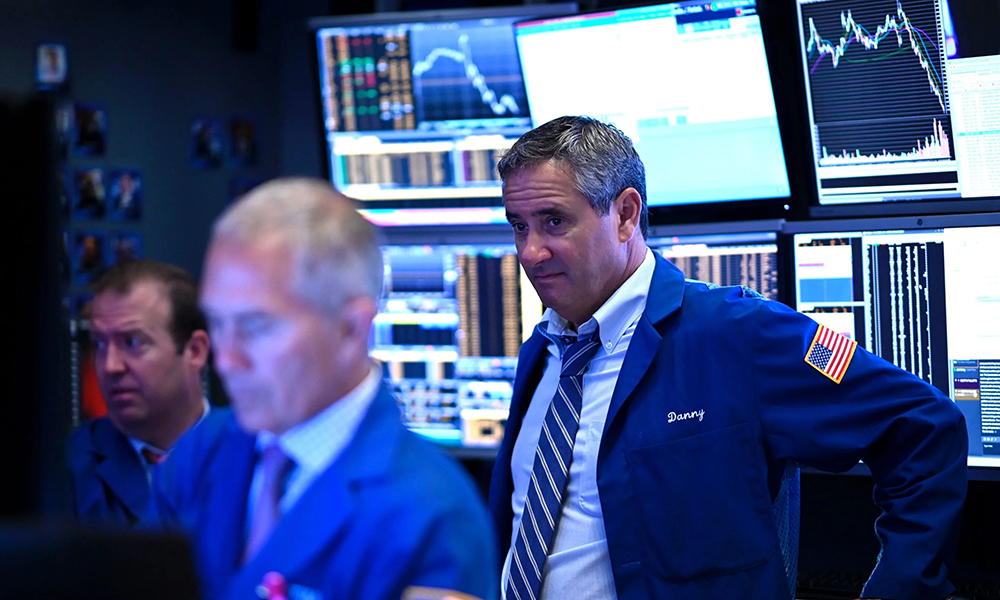
在過去一年時間里,在20世紀80年代以來從未見過的通貨膨脹中,美國人苦苦掙扎著支付賬單,不得不精打細算,呼吁漲薪。但對于企業來說,情況就完全不同了。
美國商務部(Commerce Department)周三公布的數據顯示,企業利潤屢創新高,非金融企業在第三季度創下了約2萬億美元的最新紀錄。
雖然利潤增長被大肆報道,并導致民主黨高層指責高管們“哄抬物價”,但摩根士丹利的首席信息官和首席美國股票策略師邁克·威爾遜(Mike Wilson)說,投資者在很大程度上忽視了通脹給企業帶來的好處——他們絕對忽視了當這種好處消失時會發生什么。
威爾遜最近獲封《機構投資者》(Institutional Investor)首席股票策略師。他認為,隨著通脹消退,將拉低企業利潤和收益。
“通脹是推動利潤上升的原因。因此,隨著明年通脹率下降……這對股市很不利。”他周四對彭博社(Bloomberg)表示。“這將擠壓利潤……我們認為,這是很多投資者低估的地方。”
威爾遜說,他預計到2023年底,通脹率將降至2%-3%之間。
許多股市投資者一直希望通脹結束,因為這將使美聯儲(Federal Reserve)放緩、停止甚至逆轉加息,而加息會拖累股價。
Fundstrat的湯姆·李(Tom Lee)甚至認為,隨著通脹消退和美聯儲放松政策,標普500指數可能在今年年底前上漲12%,達到4,500點。
但威爾遜指出,事情也有另一面。他說,隨著通脹下降,收益也會下降,這應該會在明年第一季度導致股市走低,他認為大多數同行“看跌程度不夠”。
威爾遜說,在與客戶的交談中,他發現最近的股市反彈是歷史上 “最遭人怨恨的熊市反彈”之一,因為他們認為這是個陷阱,他警告其他人不要陷入其中。
他補充說,股市短期內可能繼續上漲,但他認為,到第一季度末,標普500指數可能跌至3000點至3300點之間,較當前水平低25%左右。
為了避免股價下跌遭受損失,他建議投資者在2023年前4個月之前投資現金和債券,避免投資股票。(財富中文網)
譯者:中慧言-王芳
在過去一年時間里,在20世紀80年代以來從未見過的通貨膨脹中,美國人苦苦掙扎著支付賬單,不得不精打細算,呼吁漲薪。但對于企業來說,情況就完全不同了。
美國商務部(Commerce Department)周三公布的數據顯示,企業利潤屢創新高,非金融企業在第三季度創下了約2萬億美元的最新紀錄。
雖然利潤增長被大肆報道,并導致民主黨高層指責高管們“哄抬物價”,但摩根士丹利的首席信息官和首席美國股票策略師邁克·威爾遜(Mike Wilson)說,投資者在很大程度上忽視了通脹給企業帶來的好處——他們絕對忽視了當這種好處消失時會發生什么。
威爾遜最近獲封《機構投資者》(Institutional Investor)首席股票策略師。他認為,隨著通脹消退,將拉低企業利潤和收益。
“通脹是推動利潤上升的原因。因此,隨著明年通脹率下降……這對股市很不利。”他周四對彭博社(Bloomberg)表示。“這將擠壓利潤……我們認為,這是很多投資者低估的地方。”
威爾遜說,他預計到2023年底,通脹率將降至2%-3%之間。
許多股市投資者一直希望通脹結束,因為這將使美聯儲(Federal Reserve)放緩、停止甚至逆轉加息,而加息會拖累股價。
Fundstrat的湯姆·李(Tom Lee)甚至認為,隨著通脹消退和美聯儲放松政策,標普500指數可能在今年年底前上漲12%,達到4,500點。
但威爾遜指出,事情也有另一面。他說,隨著通脹下降,收益也會下降,這應該會在明年第一季度導致股市走低,他認為大多數同行“看跌程度不夠”。
威爾遜說,在與客戶的交談中,他發現最近的股市反彈是歷史上 “最遭人怨恨的熊市反彈”之一,因為他們認為這是個陷阱,他警告其他人不要陷入其中。
他補充說,股市短期內可能繼續上漲,但他認為,到第一季度末,標普500指數可能跌至3000點至3300點之間,較當前水平低25%左右。
為了避免股價下跌遭受損失,他建議投資者在2023年前4個月之前投資現金和債券,避免投資股票。(財富中文網)
譯者:中慧言-王芳
Over the past year, Americans have pinched pennies and called for higher wages as they struggle to pay their bills amid inflation not seen since the 1980s. But for corporations, it’s been a different story.
Corporate profits have routinely notched record highs, with the latest roughly $2 trillion high water mark being set by non-financial corporations in the third quarter, according to Commerce Department data released Wednesday.
While the profit boom has been thoroughly covered, and led top Democrats to accuse executives of “price gouging,” Morgan Stanley’s CIO and chief U.S. equity strategist Mike Wilson says that investors have largely ignored the benefits of inflation for corporations—and they’ve definitely ignored what will happen when that benefit goes away.
Wilson—who recently earned Institutional Investor’s top stock strategist title—argues that as inflation subsides, it will drag corporate margins and earnings lower.
“Inflation is what drove profits higher. So as inflation comes down next year…that’s bad for equities,” he told Bloomberg on Thursday. “It’s going to crush margins…and this is the part of the story that we think is underappreciated by a lot of investors.”
Wilson said that he is forecasting inflation to fall to between 2% to 3% by the end of 2023.
Many stock market investors have been hoping for the end of inflation, because it would allow the Federal Reserve to slow, stop, or even reverse its interest rate hikes, which are a drag on stock prices.
Fundstrat’s Tom Lee has even argued that the S&P 500 could experience a 12% rally to 4,500 before the end of the year, as inflation subsides and the Fed relaxes its policies.
But Wilson pointed out there is another side to the coin. As inflation falls, so will earnings, which should drag stocks lower in the first quarter of next year, he says, arguing most of his peers “aren’t bearish enough.”
Wilson said that in conversations with clients, he found that the recent rally in stocks is one of the “most hated bear market rallies” in history because they believe it’s a trap, and he warned others not to get caught in it.
He added that stocks may continue to rise in the near term, but argued that by the end of the first quarter, the S&P 500 could fall to between 3000 and 3300, or roughly 25% below current levels.
To avoid the drop, he recommended investors look to cash and bonds and avoid equities until after the first four months of 2023.






